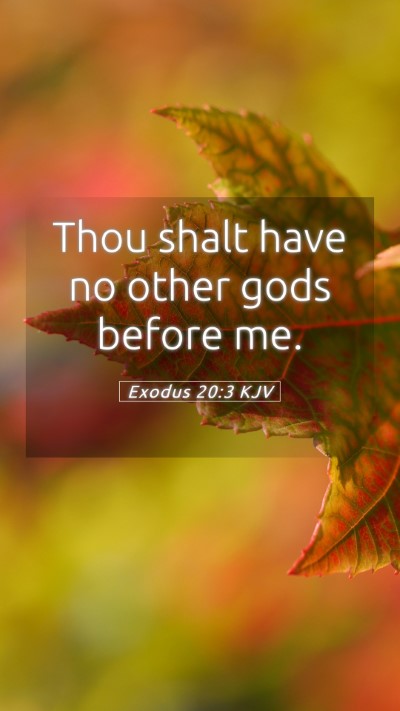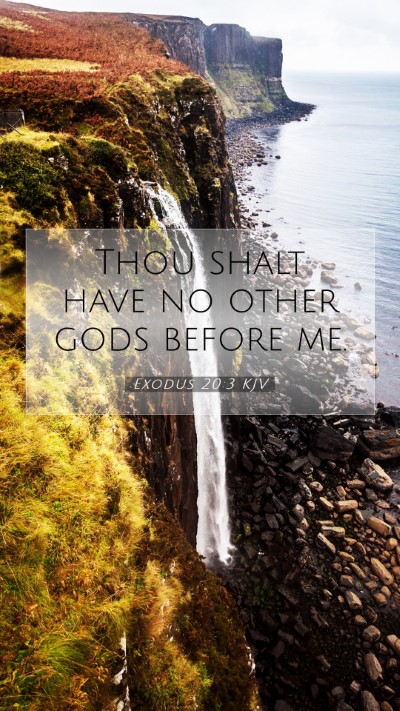Understanding Exodus 20:3
Verse: "Thou shalt have no other gods before me." - Exodus 20:3
Overview
Exodus 20:3 is part of the Ten Commandments, which form a foundational ethical code in the Judeo-Christian tradition. This commandment emphasizes the exclusivity of worship owed to God and forbids the worship of any other deities.
Commentary from Public Domain Sources
-
Matthew Henry
In his commentary, Matthew Henry emphasizes that this commandment reveals the nature of the covenant between God and His people. By stating "no other gods," it indicates not only monotheism—the belief in one God—but also the necessity of loyalty and devotion exclusively to Him. Henry highlights that anything that takes precedence in our hearts above God may become an idol, thus violating this fundamental command.
-
Albert Barnes
Albert Barnes explains that this command is foundational to understanding God’s expectations of His followers. He argues that to have 'no other gods' is to recognize God's unique position as the Creator and sovereign authority. Barnes underscores that this exclusivity forms the basis for all other commandments and ethical demands placed on believers, suggesting that genuine worship must be directed solely towards God without any distractions.
-
Adam Clarke
Adam Clarke elaborates on the cultural context of the Israelites at the time, emphasizing that they were surrounded by polytheistic societies that worshipped numerous gods. Clarke highlights that this commandment serves not just as a spiritual directive but as a protective measure for Israel, urging them to separate themselves from those practices and to develop a unique identity as God's chosen people. He further details that adherence to this command is essential for receiving God's blessings and guidance.
Theological Significance
This verse invites reflection on the nature of loyalty to God. It poses the essential question of where one’s devotion lies and challenges believers to evaluate the "gods" of modern life—materialism, success, relationships—which often vie for the throne of the heart. The challenge remains for believers today to prioritize their relationship with God above all.
Application for Today's Believer
In applying this verse to daily life, believers are encouraged to assess their commitments and worship practices. Are there influences that distract from devotion to God? This commandment encourages the faithful to cultivate a life of worship exclusively devoted to the Lord.
Cross References
- Deuteronomy 6:4-5 - "Hear, O Israel: The LORD our God, the LORD is one. Love the LORD your God with all your heart and with all your soul and with all your strength."
- Isaiah 45:5 - "I am the LORD, and there is no other; apart from me there is no God."
- 1 Corinthians 8:4-6 - "...we know that an idol is nothing at all in the world and that there is no God but one."
Conclusion
Exodus 20:3 stands as a timeless reminder of the need for undivided loyalty to God. By seeking to understand and apply this verse, believers engage in a deeper Bible study that enriches their faith and practice. Through the insights gained from various commentaries, individuals can better interpret this scripture, fostering a richer personal relationship with God and a clearer understanding of their commitment to Him.
Further Bible Study Resources
For those interested in diving deeper into Bible verse meanings and interpretations, consider exploring various Bible study tools, guides, and online resources designed to enhance your understanding of scripture. Engaging with Bible study groups or courses can also offer communal insights into understanding challenging passages and the historical contexts of biblical texts.


